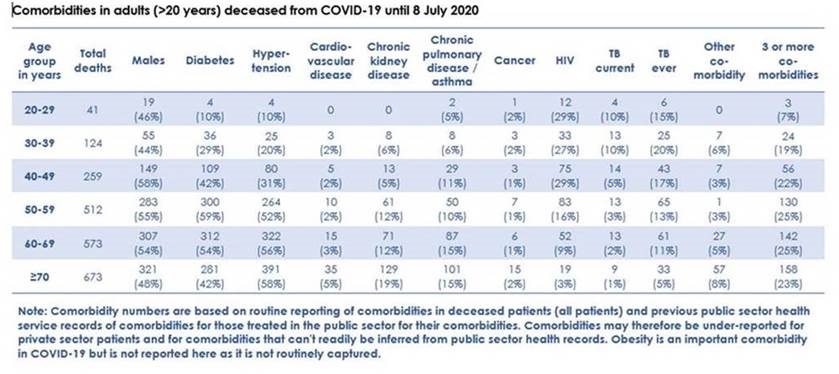News
Analysis in comorbidities in adult COVID-19 deaths
As part of the regular learnings about the COVID-19 and its effect on Western Cape citizens, the Department of Health has done comprehensive analysis of 2 182 deaths of persons over 20 years due to COVID-19 (as at 8 July), specifically looking at comorbidities (underlying illnesses) and those at risk.
Through the analysis we have found that diabetes (1 042 deaths) and hypertension (1 086 deaths) continue to be the most common comorbidities in people who have died from COVID-19. Additional analysis indicates that:
- 513 people had three or more comorbidities
- 68 (cardio vascular disease)
- 277 (chronic pulmonary disease)
- 35 (cancer)
- 274 (HIV)
- 66 (TB current)
- 233 (TB previously)
- 99 (other comorbidities)
*Numbers will not add up several people had more than one comorbidity
Persons over the age of 55 or people of any age who have a chronic condition are at a higher risk for severe COVID-19 illness and should take extra precautions to protect themselves. In addition to the usual hand hygiene and social distancing measures, vulnerable patients should take extra care by following the steps below:
- Avoid getting the virus by staying home and shielding themselves from others (this can refer to keeping apart as much as possible and also very stringent mask wearing when in contact with others)
- If you develop COVID-19 symptoms, go for immediate testing, do not delay
- Look after your health by following a healthy lifestyle and take your medication regularly
- Get help immediately if you do not feel well
When people with diabetes do not manage their condition well and experience fluctuating blood glucose levels, they are generally at risk for a number of diabetes-related complications.
The Department has implemented an action plan for the management of Diabetic patients with COVID symptoms which includes expanding testing for diabetics who represent a high risk group. Our current data suggests that these patients are presenting or are being admitted too late in a very sick conditions, which has dire outcomes. Thus is important for this group to get help, test, and seek care earlier.
Diabetic patients are encouraged to stay home and access the Pocket Clinic WhatsApp channel to ensure their medications are delivered to their homes. Patients are encouraged to send ‘Hi’ to 087 240 6122 to ensure we are able to deliver their medication at home.
Through our community health workers (CHWs), since 1 April we have also been able to deliver 335 320 medication parcels to the homes of those members at high risk of contracting severe COVID-19 illness. Of these 52 650 parcels were returned due to incorrect address details. We appeal to our patients to contact their local facility to ensure their address details are correct to avoid non-essential trips to health facilities
Patients, the elderly and those with other chronic conditions, can minimise this risk by being proactive with a number of prevention strategies, particularly during the COVID-19 pandemic:
- Keep hydrated and monitor your blood glucose and temperature.
- Take your medication correctly as prescribed by your health worker.
- Try to make time to do physical activities for at least 30 minutes a day.
- Managing diabetes means keeping your blood sugar levels as normal as possible (<5.5mmol) by eating healthy food. Have small regular meals.
We can all help save lives by changing our behaviour and help support our loved ones who may be at higher risk of severe COVID-19
If you are concerned about your symptoms, please discuss these with your health worker. Call the clinic first but wear your cloth mask if you must go to the clinic. Diabetes can be treated and managed. You can still lead a normal, healthy life with diabetes, even during this COVID-19 time.
Analysis:



